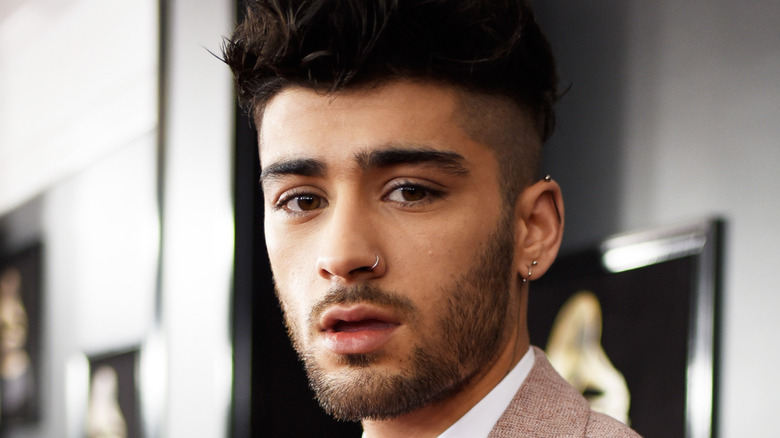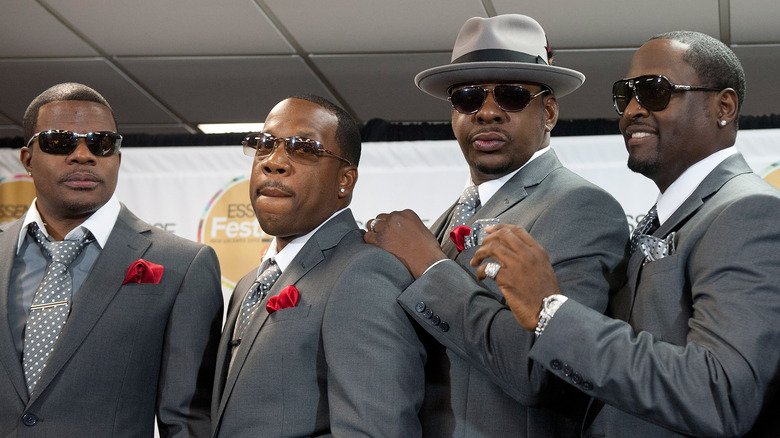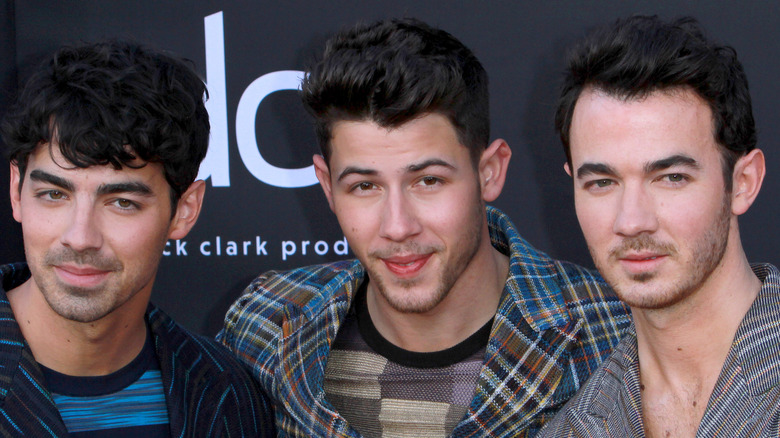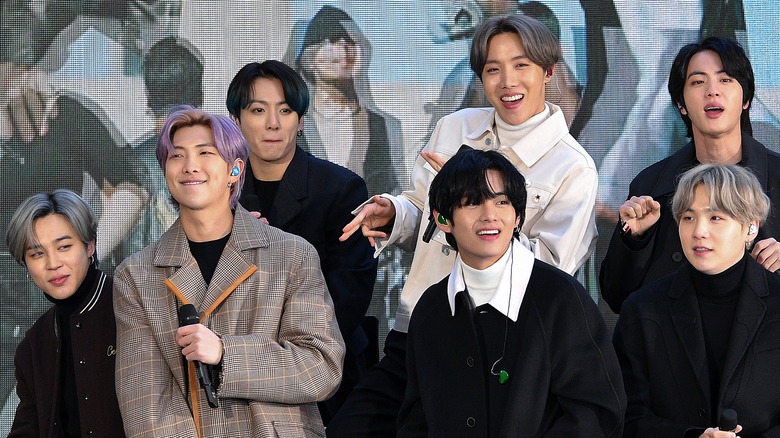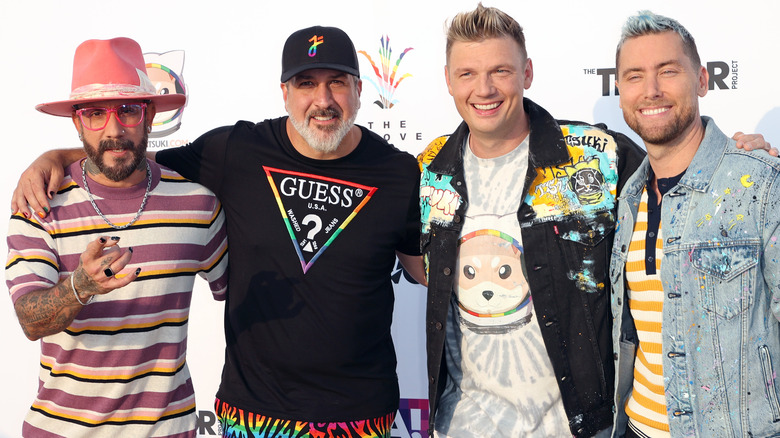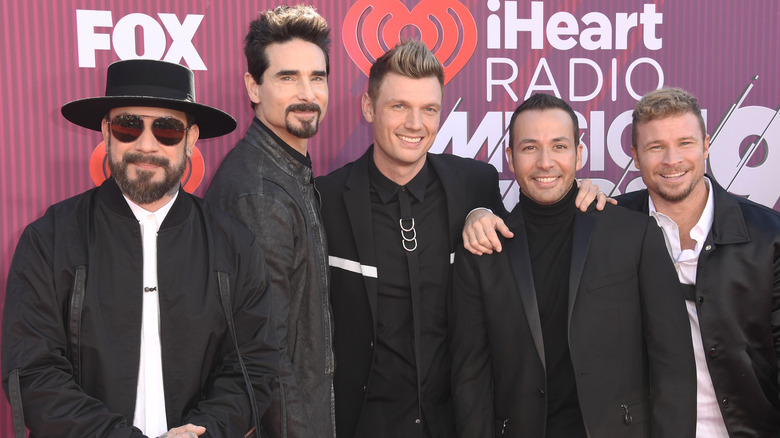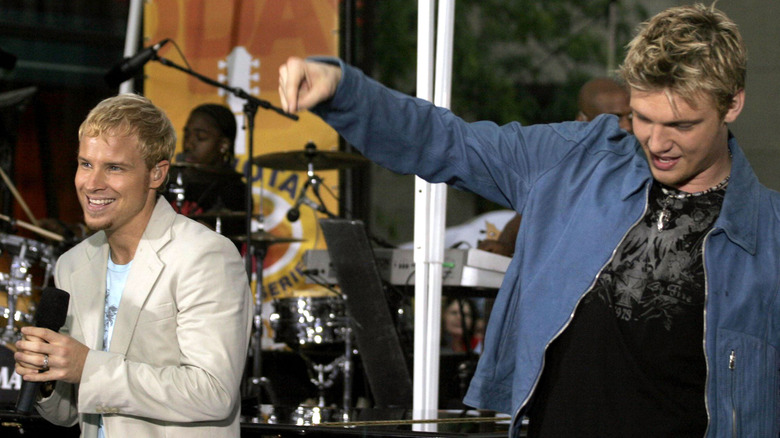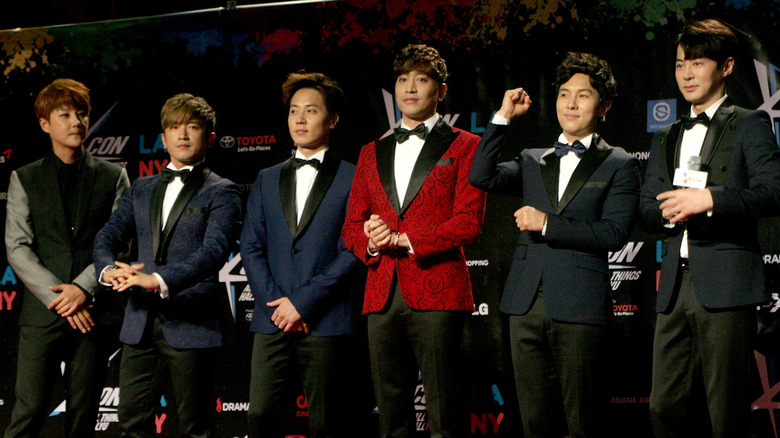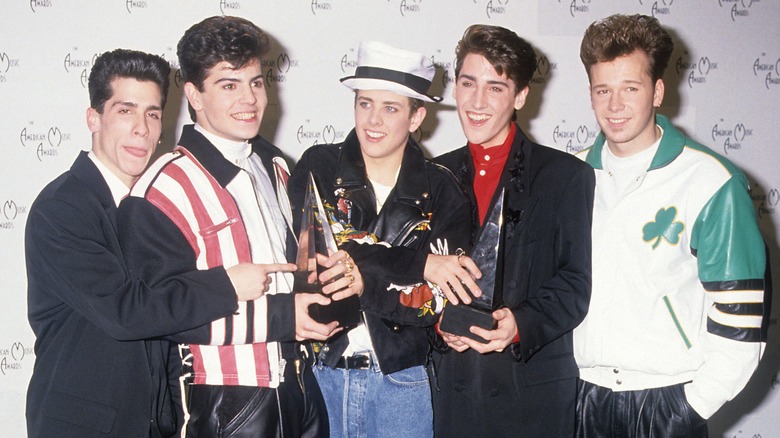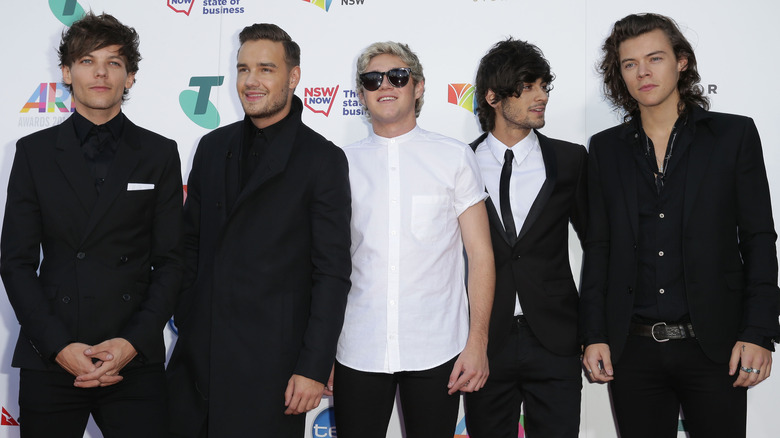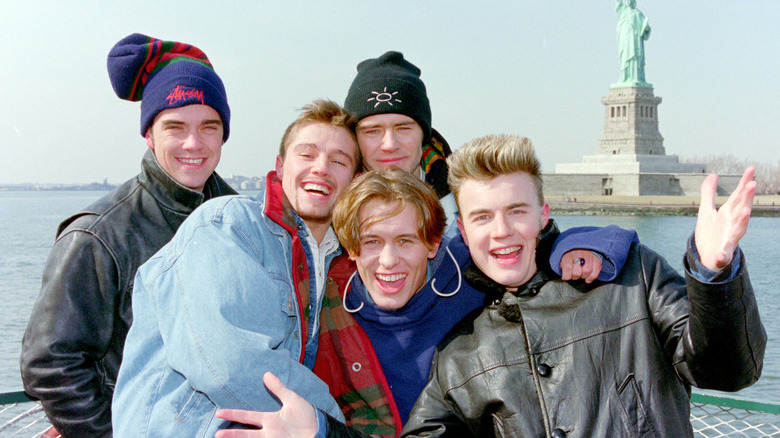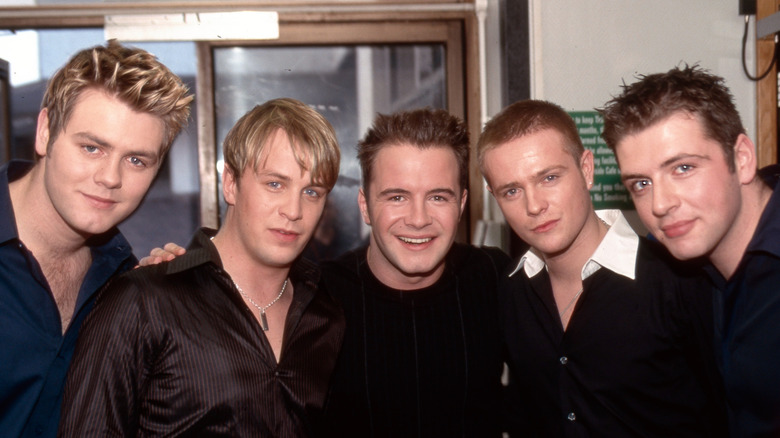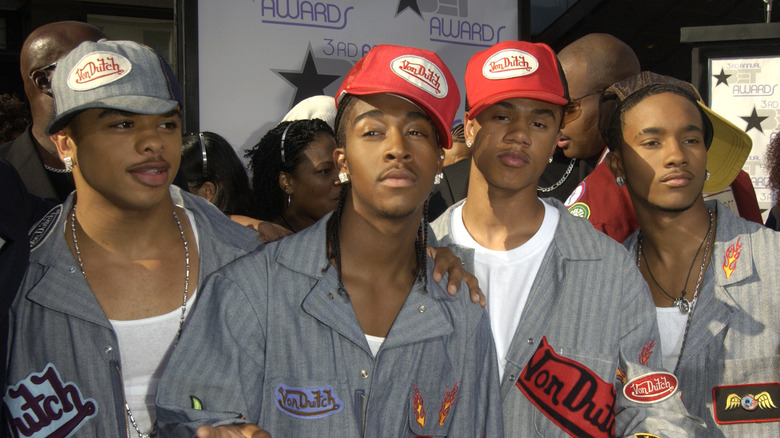The Biggest Boy Band Beefs Ever
If you know anything about pop music, it's that beef and boy bands go together like the Backstreet Boys' Frick and Frack – and it's understandable as to why. Somewhere between the pressures of the industry, the young age that most bands are thrown together at, and the close quarters that boy bands grow up together in, it's no surprise that the biggest boy band beefs tend to cover similar ground.
Many boy band feuds can stem from conflicts of everyday ego — who's the lead vocalist? Who's the 'sexy' one? And is somebody else trying to move in on that territory?! — but they can also come from a place of love. Though most boy bands will fess up to inner-band fights of some sort, many will also cop to the fact that the members are all like brothers, sometimes literally so, and the bickering and the fisticuffs come from simply wanting the best for each other.
Some of these boy bands have never fully recovered from the beef, yet others have thrived from it and continue to co-exist with the feud. Nevertheless, all of them are juicy. Sometimes, those feuds are also just good for business. NSYNC's Chris Kirkpatrick once compared boy band beefs to "hockey fights" and said, "You fight when you're on TV, but then when you're not, you get a beer together" (via Billboard). Grab yourself a hockey stick, then, because these are the biggest boy band beefs ever.
New Edition's on-stage blowout
Formed in 1978, New Edition is one of the OG boy bands, and they helped set the template for every other great teen idol pop outfit that followed. The band was enjoying great success when it ran into even greater conflict during the mid-to-late '80s when band member Bobby Brown started behaving against the band's best interests.
Brown told "Rewind That" that he "felt constricted" by the band and longed to go solo, whilst Ralph Tresvant recalled that "he was showing up when he wanted to" and sometimes "not showing up" at all (via Radar). As chronicled in BET's three-part miniseries "The New Edition Story," the conflict culminated in an on-stage fight in Oakland wherein Brown stormed the stage and snatched the microphone away from Michael Bivins mid-performance. The conflict erupted into an on-stage ruckus so unbelievable that Ricky Bell had to take to Twitter to insist it "really happened" after the episode aired.
New Edition has continued to enjoy variations of reunions over the years, including a disastrous mid-90s tour that Bell called "the worst" of his life (and for which he explained the band had to "base the whole show around" Brown not knowing "any of the routines") but the beef remains. During an appearance on "The Breakfast Club," Bell compared New Edition to being "like a marriage," and admitted that though New Edition gets along, "there's egos, there's hangovers from unresolved situations, there's still some resentments."
The Jonas Brothers hated each other
In 2013, Disney's greatest teen dream came to a crashing close when the Jonas Brothers canceled their 19-date tour just two days before it was due to start. "There is a deep rift within the band," their spokesman told People, who suggested that the main cause was due to "a big disagreement over their music direction." However, Nick Jonas put it more succinctly in the documentary "Chasing Happiness," "Nothing is working. We hate each other, basically" (via New York Post).
In 2019, Nick elaborated on the JoBro beef during a "CBS Sunday Morning" appearance where he claimed that their relationships strained under the pressures of waning fan interest and the three not feeling "super proud" of their sound. So he "laid it out" for Joe and Kevin Jonas, "I had a very tough conversation with them ... I said, 'I feel like the Jonas Brothers should be no more, and we should go on individual journeys.'" Subsequently, the brothers barely talked for months –- so much so that Nick was afraid "they'd never speak to" him again.
Luckily, the JoBros rediscovered their love for one another –- and for the band -– after spending "a year basically doing therapy" together (via "The Late Late Show with James Corden"). The brothers are back, and so is the music. And they aren't the only boy band to have weathered such a storm for the better.
BTS butted heads at first
It might be difficult to believe considering just how much the seven members of K-pop boy band BTS appear to get along, but according to the Bangtan Boys, there was no love lost between them all in the early days of the group. In an interview with Paper, the band revealed that the greatest challenge BTS faced was being able to put aside their differences in order to get along. And apparently, that process was fraught with tension.
"There was a time when we fought each other quite a bit because we all came from different backgrounds and our personalities were so different," J-Hope said, but explained they "overcome" their issues by communicating better over time. RM agreed, explaining that living in close quarters meant challenges were inevitable, "Seven grown men always staying close together and experiencing work and life at the same time means that we come face to face with numerous contradictions and differences."
Unlike other boy bands, BTS didn't let the conflict consume them. If anything, they all grew from the experience. Suga suggested that even the hard times at the start of the band "are all good memories," while Jimin mused that their initial beef with one another actually helped to strengthen their bond, "It was hard for everyone to understand each other, " he said, "But we didn't give up, and now we are a team where each member is irreplaceable."
Lou Pearlman's custom-built boy band beef
In the '90s, NSYNC and Backstreet Boys formed two sides of the same coin, but fans took sides and fought for their faves regardless. The rivalry between the two bands was great for business, and "secretly encouraged" by Lou Pearlman, who managed both bands at the time according to E!. Pearlman's tactic involved turning each band against the other –- something that NSYNC's Lance Bass admitted "worked like a charm" in the documentary "The Boy Band Con." "We stayed against each other our whole entire careers," he said, "I was scared of them" (via E!).
Speaking to Billboard, NSYNC reflected on the feud –- or lack thereof. Joey Fatone admitted there was some "friendly competition" between themselves and the Backstreet Boys, and also revealed that there was a time when Chris Kirkpatrick had beef with A.J. McLean over a girl. "I wanted to punch A.J.'s lights out for a little while," Kirkpatrick admitted. Fortunately, the two are "really good friends" now.
In 2021, both bands publicly buried the hatchet when Backstreet Boys' McLean and Nick Carter joined Bass and Fatone for a joint Pride performance. At the event, McLean told People the feud was "fabricated" by management, but that it had an impact on the young members of both bands, regardless. Thankfully, everyone realized over time that they had more in common than not. "We relate to one another," Carter said, adding, "It was a place in time, and our lives were very parallel."
The subtweeted Backstreet beef
2021 was a politically turbulent time. One that even the Backstreet Boys weren't immune to feeling the tensions of. This particular beef began when Brian Littrell -– who once voiced his impassioned support for Donald Trump to TMZ – further extended this support by sharing his Parler handle on Twitter and suggesting his fans join him on there.
As a recap: Parler is an "alternative social network popular with conservatives" and it's been banned by Apple, Google, and Amazon due to the platform's apparent failure "to rein in hate-filled, violent speech," according to CNN. It became particularly popular after Facebook and Twitter banned Trump from their platforms following statements he made during the Capitol Attacks (via TechCrunch), and it appeared to have a big following from QAnon believers.
Though Kevin Richardson didn't directly address Littrell's Parler post, he did raise eyebrows by sharing a link on his Twitter to a Cosmopolitan article titled, "I lost a Best Friend to QAnon." For the caption, he wrote, "Interesting read" and added a couple of emojis – a pair of eyes, peace sign fingers, and a heart — which pointed toward a personal agenda. But he wasn't the only Backstreet Boy who appeared to be subtweeting on the matter. Just hours before Littrell's Twitter post, A.J. McLean shared a photo of himself on Twitter drinking from a Joe Biden and Kamala Harris mug. We can only imagine how hot the BSB group text must have been popping off that week.
The Frick and Frack feud
When the Backstreet Boys started out in the early '90s, Brian Littrell was made the guardian of bandmate Nick Carter who was just 13 at the time. The two were "inseparable" according to AJ McLean who told HuffPost that fans had even affectionately nicknamed them "Frick and Frack." Fast forward a little over 20 years, and Frick and Frack had apparently fallen out.
Littrell had been diagnosed with muscle tension dysphonia (via CBS News) — a condition that impaired his vocal range. And as shown in the documentary "Show Em What You're Made Of," Carter didn't hold back in hurling barbs at his former bestie during a blow-out argument about Littrell's handling of the issue, shouting, "Don't be a f***ing d**k like everyone knows you are." Meanwhile, Littrell went for a low blow by suggesting he'd been doing some serious heavy lifting for Carter all these years, "I can't do your job anymore."
Historically, the Backstreet Boys are no strangers to inner-band beef. But as Kevin Richardson once confessed to CBS News, those conflicts are often rooted in a place of brotherhood, "We love hard, but we also fight hard," he said, noting, "there's been fistfights in this group." And clearly, this particular beef may have also come from a similar place of brotherly concern, "I genuinely want you to get better," Carter said, at the end of their fight, "I miss that voice ... and I believe you can have it back."
Shinhwa's inner-band sabotage attempt
The beginning of 2021 was turbulent for K-Pop fans: Shinhwa appeared to be breaking up right in front of their very eyes. The beef that almost blew up South Korea's longest-running boy band began when Dong-wan made a comment while chatting to fans on the social app Clubhouse where he suggested the band was "facing some difficulties because one of the members has become tired of working" According to Korea JoongAng Daily.
In response, Eric posted a (since-deleted) message on his Instagram which suggested that not only was Dong-wan only telling "one side of the story," but that he was also not communicating well with the team, and was instead complaining to fans about his concerns –- stirring up unnecessary drama in doing so. "The members who are working sincerely have been getting cursed at," he wrote, "Don't you think that's too much?" (via KPopHit).
As reported by Korea JoongAng Daily, the band's fan club – Shinhwa Changjo – came to the rescue, and intervened in the band's dispute while "mitigating the situation." In a since-deleted Instagram post, Eric shared a photo of the band's group chat and confirmed that they'd resolved the issue thanks to Changjo "running to clear things up as soon as they heard that Shinhwa was in danger."
The Kids really did hang tough
New Kids on the Block were actual kids when they rose to stardom quickly in the late 80s, and they may have been too young to handle the fame and success that followed. A deeply concerned Los Angeles Times report from September 1990 detailed how the band had been involved "in at least six violent incidents" within that month alone, including Donnie Wahlberg allegedly scuffling during an in-flight fight with a Harvard student like a scene straight out of "Good Will Hunting" (via The Crimson). The band's lawyer was horrified and promised change, "Some program is going to be established to change things around as to how they conduct themselves," he said, "I think something has to be done.
Despite four of the five band members being school friends –- with Jordan Knight being the younger brother of Jonathan Knight, and Joey McIntyre being the one kid that nobody knew –- New Kids on the Block also had beef with each other, too. Jonathan told the Boston Herald that though they were all friends, "as things went on, we were constantly fighting with each other." Outlining how the band used to do "300 days a year on tour," the performer suggested that the rigors of an adult work schedule were "all too much" for the band. "We were teenagers and we didn't really have our own lives," he said, adding, "Anyone that age would have acted the same way."
The beefy ballad of Zayn Malik
In 2015, Zayn Malik announced his emancipation from One Direction, stating that he just wanted "to be a normal 22-year-old ... out of the spotlight" for a while (via E!). And though he vowed that the rest of the lads were his "four friends for life," the beef that ensued between Malik and One Direction for years afterward suggested this statement wasn't exactly the case.
Just after Malik left, for instance, he had to prompt Louis Tomlinson to stop arguing with Naughty Boy — a producer Malik was working with — by saying, "Remember when you had a life and stopped making bi***y comments about mine?" (via People). Relations further soured when Malik "didn't show" for a supportive "X-Factor" appearance with the rest of the band after Tomlinson's mom died. "It was just seeing everyone there," he said on the Dan Wootton podcast, "That was what I needed that night, that support" (via The Sun).
Over the years, the beef appeared to deepen to the point where Malik was no longer in touch with the rest of the band. He suggested to Vogue UK that One Direction had said unexpectedly "snide things" about him after he'd left and subsequently hadn't spoken "to any of them for a long time." Niall Horan defended their apparent cold shoulder to The Sun, accusing Malik of being "the hardest man to get in touch with." But who needs to get in touch with someone when you can just communicate via online shade?
Could it be magic? Not for Robbie Williams
After five years of saucy pop gymnastics, the British boy band Take That broke hearts across the country when it was announced that resident cheeky chappy Robbie Williams would no longer be a member. Williams told BBC Radio 4 that he was "drinking heavily" at the time and the rest of the lads wanted him out as soon as possible with bandmate Jason Orange telling him, "'We think it's best you go now, so we can prove we can do this as a four-piece.'" (via Gigwise).
Whatever tensions existed prior to his leaving, arguably grew worse afterward. Williams had to pay his way out of his million-dollar contract, leaving him "owing £500,000," to them (via Gigwise). Meanwhile, Take That discovered that they couldn't hack it "as a four-piece" after all, and called it quits in '96. However, while Williams' solo career went from strength to strength, that of Gary Barlow — the band's principal songwriter — initially floundered and flopped.
In a 2010 documentary, Williams revealed that his success was partly motivated by rage. "My problem has always been with Gary," he said, "I wanted to crush him." Meanwhile, Barlow admitted in the documentary that seeing his former bandmate's success was "a constant daily mock" that made him feel "like a total loser" (via Express). Apparently, time really does heal all though, and the two buried the hatchet enough for Williams to collaborate with Barlow and Take That on-and-off since 2010.
Westlife were flying without Bryan McFadden
Like Robbie Williams of Take That, Brian McFadden left Westlife at the peak of their fame. Unlike Williams, however, the decision to exit the band was his own. As reported by The Guardian, McFadden insisted the Irish outfit were his "best friends," and his decision to leave simply came down to wanting to see more of his wife and kids. Westlife was reportedly "devastated" but insisted the split was amicable. They always do.
A few months later, McFadden had embarked on a shaky solo career and had left the wife he said he wanted to see more of (via Independent). All the while, Westlife thrived without him, scoring number 1 hits and selling out tours across the U.K. The band's beef then surged to the surface when Kian Egan assured The Mirror that Westlife would never welcome McFadden back. "Do you think he should come back?" he asked, "The four of us have spent the past eight years working our a**es off to keep it together. And he hasn't."
By 2015, McFadden appeared to somewhat regret his decision and mused to the Irish Independent that he "would have made a lot of money" if he'd stayed. Worse still, McFadden later claimed the rest of Westlife had turned down "a big multi-million-pound deal" from Simon Cowell to reunite with McFadden back in the band. "They didn't want me back," McFadden said, probably while the world's smallest violin played in the background (via The Irish Sun).
B2K and the woman in the middle
B2K's Lil Fizz found himself in the middle of some alleged big beef when he started dating model and fellow "Love & Hip Hop: Hollywood" star Apryl Jones in 2019. The problem? Jones was the ex-partner of Fizz's B2K bandmate — and fellow "LHHH" star — Omarion. B2K had only just reformed and was coming to the end of their 2019 Millennium Tour when the "Ice Box" singer found out about the relationship. "A birdie just kind of floated the info to me," Omarion said during a Big Boy TV interview, "That was kind of it."
Eyebrows were raised when Omarion then announced the 2020 Millennium Tour lineup as being conspicuously absent of B2K — and chose to make the announcement on Lil Fizz's birthday (via Capital Xtra). Though shade wasn't directly thrown, it was nonetheless lurking between the lines. B2K member J Boog was certainly mad enough to take to Instagram Live to direct his blame openly on Fizz, who he claimed had "ruined everything" (Via Madame Noire).
Meanwhile, Omarion earned himself the nickname "King of Unbothered" by fans due to just how little he was shown to care (via People). Apparently, this came naturally to the crooner who claimed to Big Boy TV that he and Fizz "don't have a relationship" and haven't really had one for 20 years. Regardless, he was open to discussion and added, "I think that there should be an opportunity for us to talk one day."

